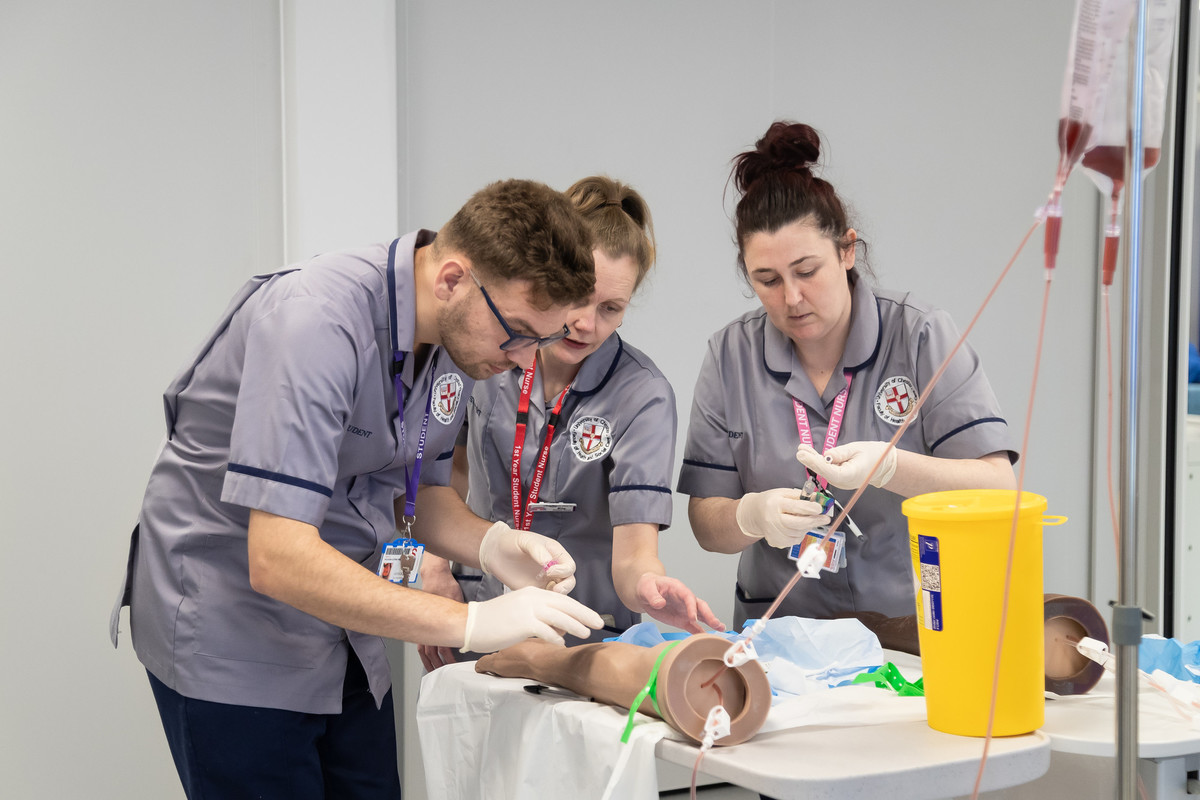Doctor of Professional Studies in Health and Social Care DProf


Health and Social Care Doctorate Information Events
If you’re a registered professional working within health and social services, and thinking of studying for a doctorate, then join us at one of our online Doctorate Information Events.
You are viewing Course summary
Course Summary
This course is designed to support graduate professionals working across diverse health and social care sectors to conduct doctoral research in this complex and evolving arena.
Research into health and social care is of major importance in the current social and economic climate. This increases the demand for practitioners who are able to effectively lead, innovate and evaluate service provision with a limited resource allocation. This course is designed to enable the personal and professional development of individuals working within these areas.
Health and social care research continues to be at the vanguard of social, economic and political debates.
This course is designed and delivered by a team of academics who are research active and committed to the ongoing development of health and social care policy, practice and service delivery. You will therefore be joining a community where debate and critical thought are both welcomed and fostered.
You will be encouraged to reflect upon current practice, explore new ways of thinking, explore new or different theoretical perspectives, and offer new insights into the chosen field of study.
What you'llStudy
Research methodologies, social theory, philosophy, cultural practices and policy form the major themes around which the modules and teaching is structured. The self-selected doctoral thesis will require you to apply the knowledge and skills that you have gained during the taught components of the course.
Module content:
The module content will include:
- Use of leadership frameworks and toolkits, values, beliefs, self-awareness, role modelling, personal motivation, personal boundaries, creativity, mind mapping, action planning development, action learning sets, reflective practice.
- Vision, setting direction, transformational leadership, innovation, influencing and negotiating skills, environmental scanning, organisational culture, embracing equality and diversity.
- Systems thinking, theories and models, barriers to change, conflict resolution, organisational development, why leaders succeed or fail.
- Team building, winning teams, leading change through teamwork, the learning organisation.
- Political, economic, social and technological drivers for change.
- Service vision, collaborative working, client participation, integration and inclusiveness, advocacy and empowerment, governance and accountability.
Module aims:
The aims of the module are:
- To enable students to utilise leadership skills in order to lead change in service provision, delivery and personal development.
- To promote a critical understanding of the need for effective leadership, within the health and social care setting.
- To promote appropriate strategies for critical thinking and reflective practice.
Module content:
Module indicative content:
The module equips participants to interpret and critically assess the making and embedding of policy for integrated service delivery and multi-professional working.
- Evaluating definitions and perspectives on policy making from a variety of disciplines - public policy, policy sociology, organisational studies
- Acquiring the skills and perspectives for policy analysis across the public services
- Assess the political and ideological foundations of policy in appropriate public service environments
- Acquire the ability to conduct an enquiry into the impact of policy within a multi-professional setting
Module aims:
The module aims to:
- Explore and critically evaluate the theoretical methodological and ethical issues involved in analysing the impact of policy on practice within multi-professional organisational settings
- To acquire the skills of enquiry and analysis for applied policy research.
- To enhance awareness of the construction and implementation of policy for organisational change in the public services.

Professional Doctorate in Health and Social Care
The first stage of the course comprises five taught modules that are delivered flexibly (predominately classroom based), to fit in with the busy schedules of working professionals. You will study these modules as a member of a group in which collaborative support for learning will be encouraged, and we aim to furnish you with the critical skills to enable you to conduct research at doctoral level.
There are a range of assessments, including poster presentations, oral presentations, and written work culminating in the production of a thesis.
The five taught modules comprise a total of 2,400 notional hours’ learning time, of which 120 hours are direct contact. Each 40-credit module has 20 hours’ contact time, and each 60-credit module has 30 hours’ contact time. The independent thesis module has a notional learning time of 3,000 hours.
Beyond the Classroom
The Faculty of Health, Medicine and Society offers a wide range of doctoral events that students are expected to engage with, including doctoral seminars delivered by current students about their research, writing workshops, masterclasses by internal and external experienced researchers, journal club, Faculty and University research conferences.
Entry Requirements
2:1 honours degree
Applicants must have:
- A relevant honours degree (usually minimum of 2:1)
- A relevant Master’s degree
- A minimum of two years’ experience in their chosen field
We are unable to consider International applicants for this programme.
Fees and Funding
£2,503per year (2025/26)
The tuition fees for home students studying the Doctor of Professional Studies (DProf) in Health and Social Care in 2025/26 are £2,503 per year.
£7,542per year (2025/26)
The tuition fees for International students studying this part-time course in 2025/26 are £7,542 per year.
For more information, go to our International Fees, Scholarship and Finance section.
Irish Nationals living in the UK or ROI are treated as Home students for Tuition Fee Purposes.
Your course will involve additional costs not covered by your tuition fees. This may include books, printing, photocopying, educational stationery and related materials, specialist clothing, travel to placements, optional field trips and software. Compulsory field trips are covered by your tuition fees.
The University of Chester supports fair access for students who may need additional support through a range of bursaries and scholarships.
Full details, as well as terms and conditions for all bursaries and scholarships can be found on the Fees and Finance section of our website.
Your Future Career
Job Prospects
Generally, all the students who apply or who are currently undertaking this programme are employed within the health and social care arena.
Careers service
The University has an award-winning Careers and Employability service which provides a variety of employability-enhancing experiences; through the curriculum, through employer contact, tailored group sessions, individual information, advice and guidance.
Careers and Employability aims to deliver a service which is inclusive, impartial, welcoming, informed and tailored to your personal goals and aspirations, to enable you to develop as an individual and contribute to the business and community in which you will live and work.
We are here to help you plan your future, make the most of your time at University and to enhance your employability. We provide access to part-time jobs, extra-curricular employability-enhancing workshops and offer practical one-to-one help with career planning, including help with CVs, applications and mock interviews. We also deliver group sessions on career planning within each course and we have a wide range of extensive information covering graduate jobs and postgraduate study.





